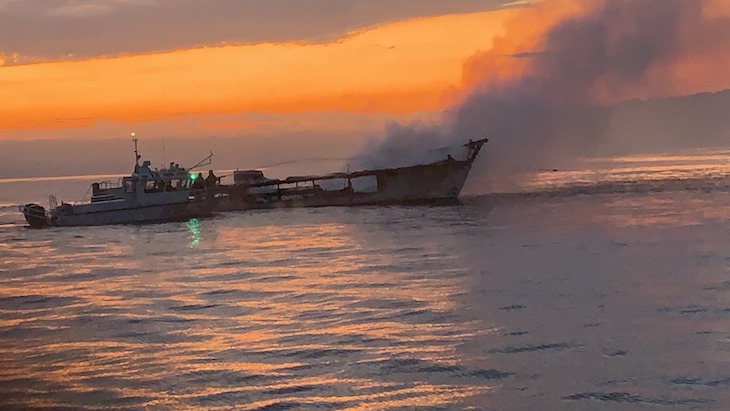Source: Offices of Rep. Carbajal and Sen. Feinstein
[On Thursday], Rep. Salud Carbajal issued the following statement in response to a letter from the US Coast Guard Vice Admiral to the Chairman of the National Transportation Safety Board announcing the Coast Guard concurs with the safety recommendations outlined in the Small Passenger Vessel Safety Act and will develop updated regulations as mandated by the bill.
“I am grateful to see that the Coast Guard is moving forward with implementing my Small Passenger Vessel Safety Act in a timely manner,” said Rep. Carbajal. “The Conception boat fire was an avoidable incident and I’m thankful the Coast Guard is taking the necessary and imperative steps to protect lives by ensuring a similar incident does not happen again.”
“The Conception boat fire was a horrific accident that never should have happened. Outdated safety regulations contributed to the tragic deaths of 34 passengers,” said Sen. Dianne Feinstein. “I worked with Representatives Carbajal and Brownley last year to pass a bill that would update these regulations and help ensure more lives aren’t lost in similar accidents. I’m pleased by the Coast Guard’s move to implement the lifesaving changes our bill requires.”

Key safety measures to implemented include:
-
Smoke Detectors & Interconnected Fire Alarms: All new and currently-in-use small passenger vessels like the Conception will be required to have smoke detectors and interconnected fire alarms in all accommodation spaces. The Conception had a smoke detector in the room where passengers slept but no smoke detector boat where the fire is believed to have started or interconnected fire alarms that would been triggered if one area detected smoke.
-
Two Means of Escape: All small passenger vessels like the Conception will be required to have no less than two independent avenues of escape. The Coast Guard is issuing a rulemaking to update this safety requirement. The Conception had two exits in the sleeping quarters, however both led to areas engulfed by fire. Moreover, one exit was a narrow and difficult-to-reach ceiling hatch.
-
Roving Watch & Safety Management Systems: Current Coast Guard regulations require a nighttime roving watch, however oversight is lacking. The Coast Guard is issuing new guidance to mandate the logging of completed night watch patrols and going through a notice and comment process for a rulemaking on safety management systems.
Background:
The Small Passenger Vessel Safety Act was introduced by Rep. Salud Carbajal, Rep. Julia Brownley, and Sen. Dianne Feinstein (D-Calif.) in the wake of the 2019 Conception Boat Fire.
The bill was signed into law on January 1, 2021 as part of the 2020 National Defense Authorization Act. The bill directs the Coast Guard to implement updated safety regulations for small passenger vessels, like the Conception.
-
The Conception boat fire killed 34 passengers in the early morning hours on September 2, 2019, in waters off Santa Cruz Island near Santa Barbara, Calif.
-
A preliminary National Transportation Safety Board report found that smoke alarms on the vessel only sounded locally and were not interconnected throughout the vessel, so the crew above decks weren’t alerted.
-
Following the Conception fire, the Coast Guard issued a Marine Safety Information Bulletin urging that operators limit the unsupervised charging of lithium ion batteries and the use of extension cords to reduce potential fire hazards.
-
Many of the passengers are believed to have died from smoke inhalation in the bunkroom because flames were blocking an emergency exit.





